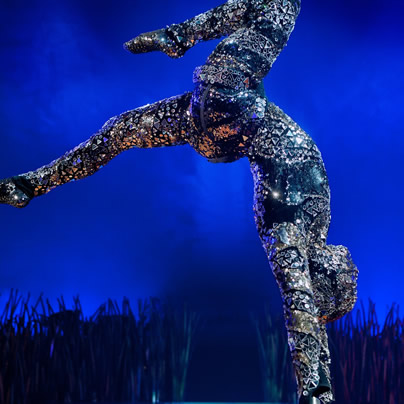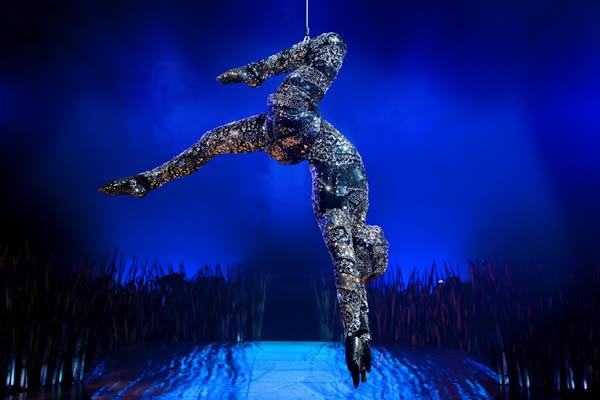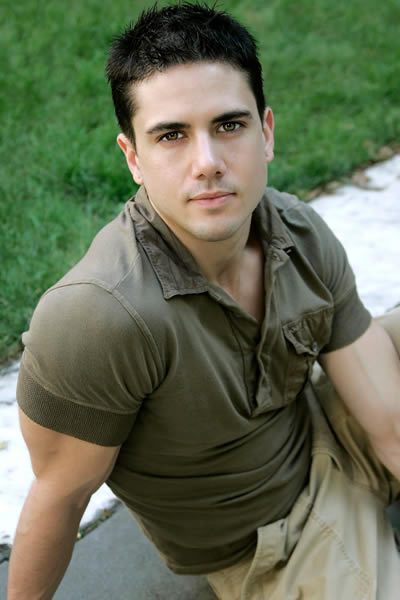Arts & Entertainment
Return to form
Gay Cirque performer in peak shape after conquering addictions


Joe Putignano says his passion for gymnastics never went away. Even in the throes of heroin addiction, he replayed his old routines in his mind. (Photo courtesy Cirque du Soleil)
Cirque du Soleil’s ‘Totem’
Aug. 15-Sept. 30
Plateau at National Harbor
201 Harbor View Ave.
Tickets: $40-$153
cirquedusoleil.com
Cirque du Soleil gymnast Joe Putignano prepares for his character in the big top show “Totem” by donning a dazzling costume containing eight pounds of Swarovski crystals. When he enters the arena, he descends from the ceiling illuminated in light.
“Totem,” which opens at the National Harbor on Wednesday, is a story about evolution, combining the scientific theories and myth that humans have developed about it. Putignano’s character, the Crystal Man, is the spark of hope and light that begins the journey. He says the character embodies Charles Darwin’s quote, “Light will be thrown on the origin of man.”
As he performs, audience members can sense the intensity and passion in the movement of his body. Company manager Jeff Lund describes him as a “human disco ball.” Putignano says, “It is difficult, performing in a heavy costume is like running a small machine and it does take a lot of practice.”
However, the audience will not realize that less than 10 years ago, the spark in Putignano’s life almost went out. At age 17, he began using various drugs, including ecstasy, cocaine and later heroin, and would not be clean again until he was around 29. When he was 19, he quit gymnastics thinking he would never return to the floor.
“I felt I betrayed myself,” he says. “I never wanted to do a handstand or a split again. It was like a divorce.”
Lund, who has worked with Putignano for almost two years and is in charge of almost all aspects of “Totem,” says Putignano’s performances these days defy his background.
“He is a world-class athlete,” he says. “His story is a very inspiring one.”
Putignano began gymnastics when he was around 8 years old, after watching the Olympic gymnasts compete on television. He says as he watched them, he knew he wanted to be doing this for the rest of his life.
He was immediately very good and began competing around the U.S. and went to the Olympic Training Center in Colorado Springs twice when he was 11 and 13.
“As a child you bend to the laws of passion,” Putignano says. “You can’t imagine as many people as passionate as you. Later you see that it is a sport and there are rules, and now everybody sees your imperfections.”
As a Boston native, he says competing in New England is different from competing with top gymnasts from around the country. For a young Putignano, the mounting pressure to reach perfection and to compete began to wear on him. Especially, as he describes, an injury can completely derail a gymnast from his path very quickly.
“We know that our art form is fleeting, we can’t take it for granted because it can leave you in a moment,” he says.
He says growing up with gymnastics made it feel like his church. Though he did not come out until he was 19, being gay and a gymnast was never an issue for Putignano. He says, “The floor has no sexuality.” But the increased competition felt like a violation of his sacred space.
Putignano began taking ecstasy and cocaine during the “’90s rave era” and eventually quit gymnastics when he was a sophomore in college.
“To be a gymnast, one has to conquer perfect precision and control over the physical capacities of the body,” he says. “To be an addict, one must surrender this control over to the underworld, and I couldn’t keep them both together.”
After walking away from competing, Putignano plunged into what would turn out to be a very dark 10 years. He moved to New York in 1999 and began using heroin. He says his experiences with the drug were full of “bitter irony.”
“The more I shot up to escape the memories of my once beautiful pure sport, the quicker I nodded out into a dreamscape of performing my old gymnastics routines,” he says. “I was shooting up to escape the memory of my failed destiny, only to be flooded into an unconscious heroin state where I performed my gymnastics skills over and over. If there was ever a layer of Dante’s inferno, this was it.”
In New York City, he worked various jobs like waiting tables and modeling. He tried to stop several times with no success.
“Eventually, I was getting older and hadn’t gotten any better and over the years I saw the tiny spark of light inside me dimming down to nothing,” he says. “That one thing which made me myself was going to burn out forever. The fear of losing this light kept me constantly chasing sobriety.”
As time went on, Putignano ended up homeless and overdosed twice where he was declared dead both times.
“At the time of my overdoses, I was so far from reality that I was actually strengthened by my experience because I believed I had beat death,” he says.
This cycle continued until he was 26, when he was in rehab for the fifth time. One day, he went up into his room and began doing headstands. Though it would be another three years before he was completely clean and intense training was required to get back in shape, his interest was rekindled. But sobriety did not come easily.
“When I started to audition for shows, I was still not completely clean,” Putignano says. “I would be three months clean and relapse.”
Putignano’s second chance in gymnastics came when he got clean and began performing at the Metropolitan Opera House and Broadway Bares. A pivotal turning point came for him when he was eventually hired by Twyla Tharp to perform in her Broadway show “The Times They Are A Changin,’” based on Bob Dylan’s music. This was important to Putignano, as he was rejected from the show twice before being hired.
“It was such an important point in my sobriety. Tharp is an icon in the dance world,” he says.
While performing on Broadway and the Opera house, he connected with Robert Lepage, one of the creators of Cirque du Soleil. Lepage knew Putignano’s background and asked him if he would like to be part of show. Putignano says it is not a coincidence that his character should represent hope and light in the world.
“For myself, my character represents my sobriety, my hope, my faith and the relentless power of the human spirit,” he says.
Now six days a week, he brings that light to others through the 4,000 pieces of reflective glass. And just like Putignano, Lund says the costume is far more durable than it seems.
“At the end of the night, it gets thrown in the wash with everything else,” he says. “Sometimes pieces will fall off, but we have people who will reattach them when it happens.”
With a tight performing schedule and around six years of sobriety under his belt, Putignano says remaining sober is still a challenge.
“I would love to say that touring has been easy for me in sobriety, but the truth is, it isn’t,” he says. “Some humans are like trees and they need to stay close to their roots. My sober network is in New York City and it has been difficult without them.”
Despite the challenge, he has remained clean so far and he is able to use his experiences to be an emotional support for other performers. He says since he has been in dark places himself, he can be empathetic to others’ emotional struggles.
Lund describes the “Totem” performers and crew as one big family. Nationality and sexuality do not matter there, he says.
“For me as a manager, I try to avoid making lines between artists and technicians and so on, “ he says. “I know in other companies it may be like that, but I like my entire crew to be connected with each other. This is made easy since we are on the road together for so much out of the year.”
What keeps Putignano going is the thought that many who have been in his position have not received a second chance.
“I have to continue to carry the torch for the dead, for those who didn’t get a second chance and I have to do everything in my power to bring hope to the hopeless,” he says. “I was once the hopeless.”
Another Cirque show to open in Baltimore
“Dralion,” Cirque du Soleil’s acrobatic show that fuses influences from the East and the West, is opening in Baltimore on Aug. 22 and runs through Aug. 26.
The name of the show represents the different parts of the world combined— it’s the combination of the dragon, representing the East, and the lion, representing the west. It mainly draws on the 3,000-year-old tradition of Chinese acrobatics combined with the more modern Cirque du Soleil twist, according to the website.
In the show, the four elements of nature come to life. At first they are separated and have their distinct colors. Air is blue, water is green, fire is red and earth is ochre. When they are combined balance is achieved.
“Dralion” is one of Cirque du Soleil’s arena shows, and is performing at the 1st Mariner Arena (201 West Baltimore St.) Tickets range from $40 to $165. For more information, visit cirquedusoleil.com.
Books
Love or fear flying you’ll devour ‘Why Fly’
New book chronicles a lifetime obsession with aircraft

‘Why Fly’
By Caroline Paul
c. 2026, Bloomsbury
$27.99/256 pages
Tray table folded up.
Check. Your seat is in the upright position, the airflow above your head is just the way you like it, and you’re ready to go. The flight crew is making final preparations. The lights are off and the plane is backing up. All you need now is “Why Fly” by Caroline Paul, and buckle up.

When she was very young, Paul was “obsessed” with tales of adventure, devouring accounts written by men of their derring-do. The only female adventure-seeker she knew about then was Amelia Earhart; later, she learned of other adventuresome women, including aviatrix Bessie Coleman, and Paul was transfixed.
Time passed; Paul grew up to create a life of adventure all her own.
Then, the year her marriage started to fracture, she switched her obsession from general exploits to flight.
Specifically, Paul loves experimental aircraft, some of which, like her “trike,” can be made from a kit at home. Others, like Woodstock, her beloved yellow gyrocopter, are major purchases that operate under different FAA rules. All flying has rules, she says, even if it seems like it should be as freewheeling as the birds it mimics.
She loves the pre-flight checklist, which is pure anticipation as well as a series of safety measures; if only a relationship had the same ritual. Paul loves her hangar, as a place of comfort and for flight in all senses of the word. She enjoys thinking about historic tales of flying, going back before the Wright Brothers, and including a man who went aloft on a lawn chair via helium-filled weather balloons.
The mere idea that she can fly any time is like a gift to Paul.
She knows a lot of people are terrified of flying, but it’s near totally safe: generally, there’s a one in almost 14 million chance of perishing in a commercial airline disaster – although, to Paul’s embarrassment and her dismay, it’s possible that both the smallest planes and the grandest loves might crash.
If you’re a fan of flying, you know what to do here. If you fear it, pry your fingernails off the armrests, take a deep breath, and head to the shelves. “Why Fly” might help you change your mind.
It’s not just that author Caroline Paul enjoys being airborne, and she tells you. It’s not that she’s honest in her explanations of being in love and being aloft. It’s the meditative aura you’ll get as you’re reading this book that makes it so appealing, despite the sometimes technical information that may flummox you between the Zen-ness. It’s not overwhelming; it mixes well with the history Paul includes, biographies, the science, heartbreak, and exciting tales of adventure and risk, but it’s there. Readers and romantics who love the outdoors, can’t resist a good mountain, and crave activity won’t mind it, though, not at all.
If you own a plane – or want to – you’ll want this book, too. It’s a great waiting-at-the-airport tale, or a tuck-in-your-suitcase-for-later read. Find “Why Fly” and you’ll see that it’s an upright kind of book.
The Blade may receive commissions from qualifying purchases made via this post.
Theater
Out actor Kevin Cahoon on starring role in ‘Chez Joey’
Arena production adapted from Broadway classic ‘Pal Joey’

‘Chez Joey’
Through March 15
Arena Stage
1101 Sixth St., S.W.
Tickets start at $93
Arenastage.org
As Melvin Snyder in the new musical “Chez Joey,” out actor Kevin Cahoon plays a showbiz society columnist who goes by the name Mrs. Knickerbocker. He functions as a sort of liaison between café society and Chicago’s Black jazz scene circa 1940s. It’s a fun part replete with varied insights, music, and dance.
“Chez Joey” is adapted from the Broadway classic “Pal Joey” by Richard Rodgers and Lorenz Hart. It’s inspired by John O’Hara’s stories based on the exploits of a small-time nightclub singer published in The New Yorker.
A warm and humorous man, Cahoon loves his work. At just six, he began his career as a rodeo clown in Houston. He won the Star Search teen division at 13 singing songs like “Some People” from “Gypsy.” He studied theater at New York University and soon after graduating set to work playing sidekicks and comedic roles.
Over the years, Cahoon has played numerous queer parts in stage productions including “Hedwig and the Angry Inch,” “La Cage aux Folles,” “Rocky Horror” as well as Peanut in “Shucked,” and George the keyboardist in “The Wedding Singer,” “a sort of unicorn of its time,” says Cahoon.
Co-directed by Tony Goldwyn and the great Savion Glover, “Chez Joey” is a terrific and fun show filled with loads of talent. Its relevant new book is by Richard Lagravenese.
On a recent Monday off from work, Cahoon shared some thoughts on past and current happenings.
WASHINGTON BLADE: Is there a through line from Kevin, the six-year-old rodeo clown, to who we see now at Arena Stage?
KEVIN CAHOON: Anytime I want to land a joke in a theater piece it goes back to that rodeo clown. It doesn’t matter if it’s Arena’s intimate Kreeger Theatre or the big rodeo at the huge Houston Astrodome.
I was in the middle stadium and there was an announcer — a scene partner really. And we were doing a back and forth in hopes of getting laughs. At that young age I was trying to understand what it takes to get laughs. It’s all about timing. Every line.
BLADE: Originally, your part in “Chez Joey” Melvin was Melba who sings “Zip,” a clever woman reporter’s song. It was sort of a star feature, where they could just pop in a star in the run of “Pal Joey.”
CAHOON: That’s right. And in former versions it was played by Martha Plimpton and before her Elaine Stritch. For “Chez Joey,” we switched gender and storyline.
We attempted to do “Zip” up until two days before we had an audience at Arena. Unexpectedly they cut “Zip” and replaced it with a fun number called “I Like to Recognize the Tune,” a song more connected to the story.
BLADE: Wow. You must be a quick study.
CAHOON: Well, we’re working with a great band.
BLADE: You’ve played a lot of queer parts. Any thoughts on queer representation?
CAHOON: Oh yes, definitely. And I’ve been very lucky that I’ve had the chance to portray these characters and introduce them to the rest of the world. I feel honored.
After originating Edna, the hyena on Broadway in “The Lion King,” I left that to do “Hedwig and the Angry Inch” as standby for John Cameron Mitchell, doing one show a week for him.
Everyone thought I was crazy to leave the biggest musical of our time with a personal contract and getting paid more money that I’d ever made to get $400 a week at the downtown Jane Street Theatre in a dicey neighborhood.
At the time, I really felt like I was with cool kids. I guess I was. And I never regretted it.
BLADE: When you play new parts, do you create new backstories for the role?
CAHOON: Every single time! For Melvin, I suggested a line about chorus boys on Lakeshore Drive.
BLADE: What’s up next for Kevin Cahoon?
CAHOON: I’m about to do the New York Theatre Workshop Gala; I’ve been doing it for nine years in a row. It’s a huge job. I’ll also be producing the “Cats: The Jellicle Ball” opening on Broadway this spring; it’s a queer-centric uptown vogue ball with gay actor André de Shields reprising his role as “Old Deuteronomy.”
BLADE: There’s a huge amount of talent onstage in “Chez Joey.”
CAHOON: There is. I’m sharing a dressing room with Myles Frost who plays Joey. He won accolades for playing Michael Jackson on Broadway. We’ve become great friends. He’s a miracle to watch on stage. And Awa [Sal Secka], a D.C. local, is great. Every night the audience falls head over heels for her. When this show goes to New York, Awa will, no doubt, be a giant star.
BLADE: Do you think “Chez Joey” might be Broadway bound?
CAHOON: I have a good feeling it is. I’ve done shows out of town that have high hopes and pedigree, but don’t necessarily make it. “Chez Joey” is a small production, it’s funny, and audiences seem to love it.

The Capital Pride Alliance held the annual Pride Reveal event at The Schuyler at The Hamilton Hotel on Thursday, Feb. 26. The theme for this year’s Capital Pride was announced: “Exist. Resist. Have the audacity!”
(Washington Blade photos by Michael Key)









































